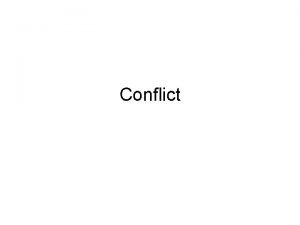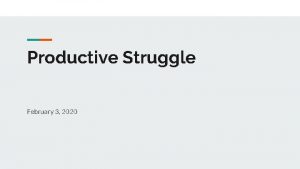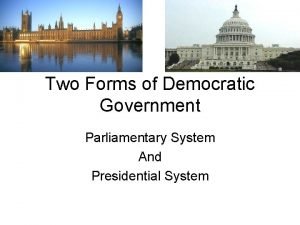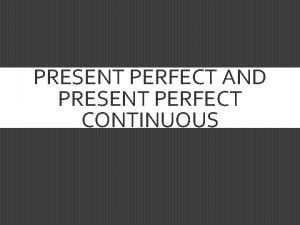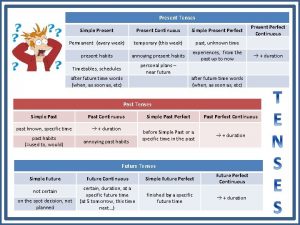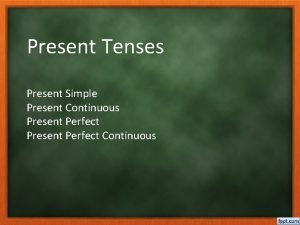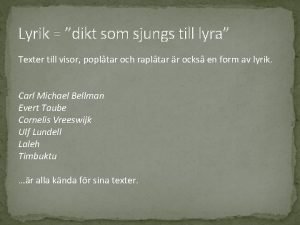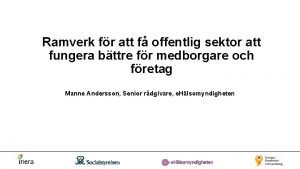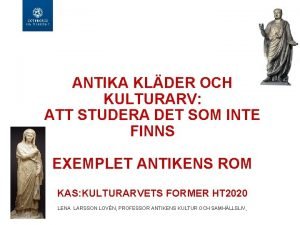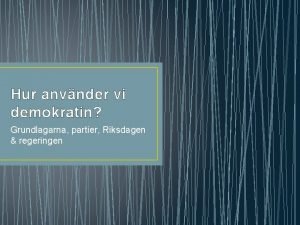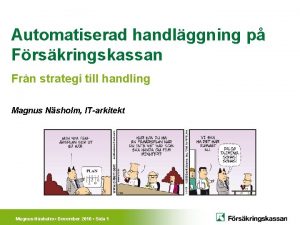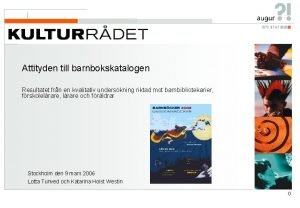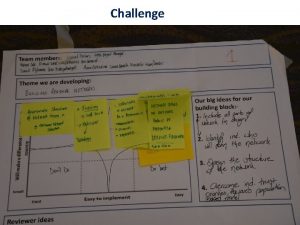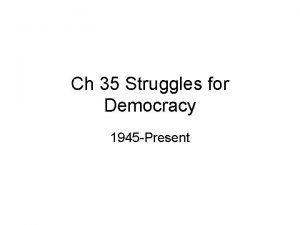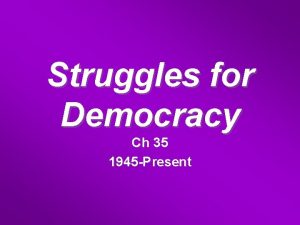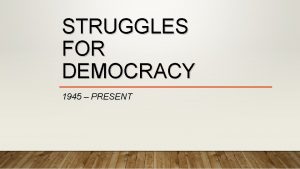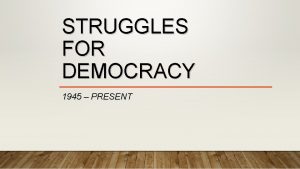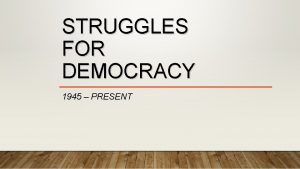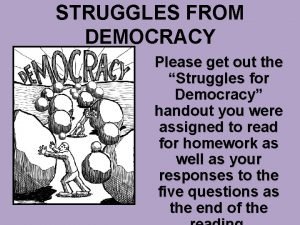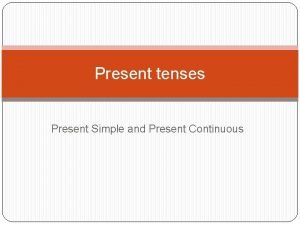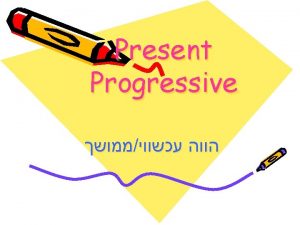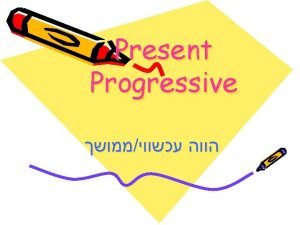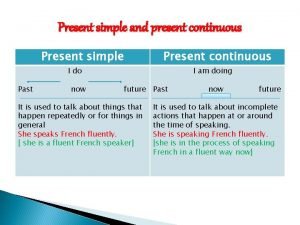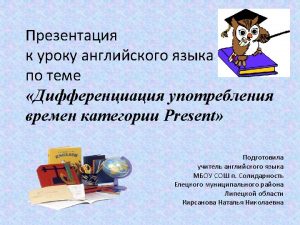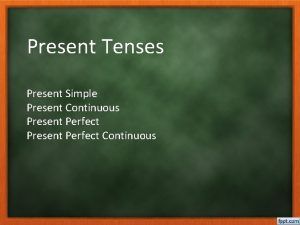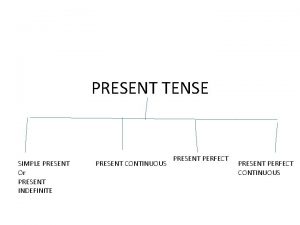STRUGGLES FOR DEMOCRACY 1945 PRESENT CHALLENGE OF DEMOCRACY





















- Slides: 21

STRUGGLES FOR DEMOCRACY 1945 – PRESENT

CHALLENGE OF DEMOCRACY IN AFRICA

INTRODUCTION “The whiles enjoy what may well be the highest standard of living in the world. Whilst Africans live in poverty and misery. Forty percent of Africans live in hopelessly overcrowded and, in some cases, drought-stricken reserves, where soil erosion and the overworking of the soil make it impossible for them to live properly off the land. Thirty percent are labourers, labour tenants, and squatters on white farms. The other thirty percent live in towns where they have developed economic and social habits which bring them closer, in many respects, to white standards. Yet forty-six percent of all African families in Johannesburg do not earn enough to keep them going. The complaint of Africans, however, is not only that they are poor and whites are rich, but that the laws which are made by the whites are designed to preserve this situation…” - Nelson Mandela, speech during his trial in South Africa, 1964

COLONIAL RULE LIMITS DEMOCRACY • When the Europeans established colonial boundaries, they ignored existing ethnic or cultural divisions • New borders divided peoples of the same background or threw different, and often rival, groups together, so sense of national identity was difficult to develop • When European colonial powers left, their old boundaries remained and so did ethnic and cultural conflicts • Economic problems • European powers had viewed colonies as sources of wealth for the mother country and encouraged the export of one or two cash crops instead of products that would serve local needs • Europeans developed plantations and mines, but few factories • Manufactured goods had to be imported from European countries *Left new African nations with unbalanced economies, a small middle class, and lessened chances to create democratic stability*

COLONIAL RULE LIMITS DEMOCRACY • When Britain and France gave up their colonies, they left fragile democratic governments in place, but problems quickly arose that threatened these government • Most newly independent nations lacked a skilled and literate workforce that could take on the task of building a new nation • Rival ethnic groups fought for power • Strong militaries became tools for ambitions leaders • In many cases, a military dictatorship replaced these democracies


CIVIL WAR IN NIGERIA • Three major ethnic groups live within Nigeria’s borders • North: Hausa-Fulani – Muslim • South: Yoruba and Igbo – Christians, Muslims or Animists • Yoruba – farming people with a tradition of kings, live to the west • Igbo – farming people who have a democratic tradition, live to the east • After independence, Nigeria adopted a FEDERAL SYSTEM – power is shared between state governments and a central authority • Set up three states, one for each region and ethnic group, with a political party in each

CIVIL WAR IN NIGERIA • Although one group dominated each state, the states also had ethnic minorities • Western region, non-Yoruba minorities began to resent Yoruba control • 1963, they tried to break away and form their own region, which led to fighting • January 1966, a group of mostly Igbo army officers, seized power in Lagos and abolished the regional government; declared MARTIAL LAW – temporary military rule • Hausa-Fulani, who didn’t trust the Igbo, launched an attack and persecuted and killed many Igbo • 1967, Igbo fled from persecution the Easter Region and seceded from Nigeria, declaring itself the new nation of Biafra

NIGERIA’S NATION-BUILDING • Nigerian government then went to war to reunite the country • Igbo were outnumbered and outgunned and surrendered in 1970 • After the war, Nigerians returned to the process of nationbuilding • The Nigerian government didn’t punish the Igbo and actually used federal dollars to rebuild the Igbo region • For most of the 1970 s, the military governed Nigeria and during that time, Nigerian leaders tried to create a more stable federal system, with a strong central government and a number of regional units • Government also tried to build a more modern economy based on oil income

NIGERIA’S NATION-BUILDING • 1979, military handed power back to civilian rulers, but democracy was short lived • 1983, the military overthrew the civilian government, charging it with corruption and a new military regime, dominated by the Hausa-Fulani, took charge • Military governed, but promised to bring back civilian rule • 1993, the army held elections which resulted in the victory of Moshood Abiola • Officers declared the results invalid and dictator General Sani Abacha took control

Moshood Abiola Sani Abacha

NIGERIA’S NATION-BUILDING • Abacha banned political activity and jailed DISSIDENTS – government opponents • 1998, Abacha died and General Abdulsalami Abubakar seized power and promised to end military rule…and he kept his word • 1999, Nigerians elected their first civilian president, Olusegun Obasanjo and he was reelected in 2003 • Obasanjo was an ethnic Yoruba from southwest Nigeria • Critical of military regimes and spent three years in jail • Worked for a strong, unified Nigeria and made progress against corruption • Nigeria still has a variety of problems ranging from war, poverty and hunger; but has increased its oil exports and is experiencing economic growth


SOUTH AFRICA UNDER APARTHEID • Racial conflict was the result of colonial rule and from its beginnings under Dutch and British control, South Africa was racially divided • 1910, South Africa gained self-rule as a dominion of the British Empire • 1931, South Africa became an independent member of the British Commonwealth • Although South Africa had a constitutional government, the constitution gave whites power and denied the black majority its rights • 1948, the National Party came to power • Promoted Afrikaner – Dutch South African – nationalism • Instituted APARTHEID – complete separation of the races • Minority government banned social contacts between whites and blacks • Established segregated schools, hospitals and neighborhoods

SOUTH AFRICA UNDER APARTHEID • 1959, the minority government set up reserves, called homelands, for the country’s major black groups • Blacks were forbidden to live in white areas unless they worked as servants or laborers for whites • Although blacks made up 75% of the population, the government set aside only 13% of the land for them, and whites kept the best land • Black majority protests • 1912, they formed the African National Congress (ANC) to fight for their rights • ANC organized strikes and boycotts • Government banned the ANC and imprisoned many of its leaders including Nelson Mandela • 1976, riots over school policies broke out in Soweto, leaving 600 students dead • 1977, police beat popular protest leader Stephen Biko to death while he was in custody • 1986, protests mounted and in response, the government declared a statewide state of emergency

STRUGGLE FOR DEMOCRACY • By the late 1980 s, South Africa was under great pressure to change • Desmond Tutu, a black South African bishop, had led an economic campaign against apartheid • Asked foreign nations not to do business with South Africa • Banned from the Olympics (1964 Tokyo Summer games) • 1989, white South Africans elected F. W. de Klerk president • Goal was to transform South Africa and end its isolation • February, 1990, he legalized the ANC and released Nelson Mandela from prison • Over the next 18 months, the South African parliament repealed apartheid laws • Country still needed to form a multiracial government • President de Klerk agreed to hold South Africa’s first universal elections, in which people of all races could vote, in April 1994

Desmond Tutu F. W. de Klerk Nelson Mandela

STRUGGLE FOR DEMOCRACY • Among the candidates were President de Klerk and Nelson Mandela • Despite threats of disrupting the process, the vote went smoothly • South Africans of all races peacefully waited at the pools in long lines • ANC won 63% of the vote and 252 of 400 seats in the National Assembly • Nelson Mandela won the presidency – ruled until 1999 • 1996, South African lawmakers passed a new, more democratic constitution • Guaranteed equal rights for all citizens


SOUTH AFRICA TODAY • 1999, ANC official Thabo Mbeki won the presidential election in a peaceful transition to power, but that didn’t mean his transition to power didn’t come without problems • High crime rates – South Africa’s rape and murder rates were among the highest in the world • Unemployment – 40% among blacks, 60% lived below the poverty line • Economic downturn discouraged foreign investment • Mbeki promoted free-market policy to repair South Africa’s infrastructure and to promote foreign investment • 2002, South Africa was in negotiations with a number of countries around the world including the EU, Japan, Canada and the U. S. • Biggest problem? AIDS epidemic • Estimates put 6 MILLION South Africans were likely to die of AIDS by 2010 • Mbeki disputed that AIDS was caused but HIV which hindered efforts

*GUIDING TAKE-AWAY* *AS THE RECENT HISTORIES OF NIGERIA AND SOUTH AFRICA SHOW, ETHNIC AND RACIAL CONFLICTS CAN HINDER DEMOCRACY. IN 1996, NIGERIA STRUGGLED WITH DEMOCRACY; SOUTH AFRICA ADOPTED A BILL OF RIGHTS THAT PROMOTES RACIAL EQUALITY*
 Chapter 14 section 3 hoover struggles with the depression
Chapter 14 section 3 hoover struggles with the depression Define productive struggles
Define productive struggles A struggle between opposing characters or forces
A struggle between opposing characters or forces Define productive struggles
Define productive struggles Fallon sherrock smoking
Fallon sherrock smoking What is parliamentary system
What is parliamentary system Present perfect present simple present continuous
Present perfect present simple present continuous Present simple present continuous and present perfect
Present simple present continuous and present perfect Which verb tenses describe continuing action?
Which verb tenses describe continuing action? I write a letter now past continuous tense
I write a letter now past continuous tense Present simple present continuous present perfect
Present simple present continuous present perfect Present perfect conjugation
Present perfect conjugation Present simple present continuous present perfect
Present simple present continuous present perfect Dikter
Dikter Nyckelkompetenser för livslångt lärande
Nyckelkompetenser för livslångt lärande Publik sektor
Publik sektor Antikt plagg i rom
Antikt plagg i rom Tidbok
Tidbok Handledning reflektionsmodellen
Handledning reflektionsmodellen Orubbliga rättigheter
Orubbliga rättigheter Verktyg för automatisering av utbetalningar
Verktyg för automatisering av utbetalningar Bamse för de yngsta
Bamse för de yngsta


